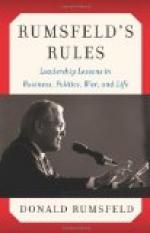The present situation is the necessary outcome of the Government’s action between the beginning of June and October 7th, when the orders for calling out the Reserves and for mobilisation were issued. The Cabinet’s decisions involved that Sir George White with his small force should have to bear the brunt of the Boer attack from the outbreak of hostilities until the time when the Army Corps should be landed and ready to move. That was at least five weeks[C] of which three have elapsed, and in the three weeks Sir George White, after one or two initial mishaps of no great consequence by themselves, is invested at Ladysmith, while Mafeking and Kimberley are waiting for relief, and the Free State Boers are invading the northern provinces of Cape Colony and trying to enlist the doubtful Dutch farmers. This is not a pleasant situation for the Nation that declares itself the paramount Power in South Africa. Three questions may be discussed with regard to it: What are the risks still run, what are the probabilities, and how can we help to prevent such a situation from recurring?
To see what has been risked on the chance that the force under Sir George White may hold its own we must look from the Boer side. The Boer commander hopes, or ought to hope, to destroy Sir George White’s force before it can be relieved. He has a chance of succeeding in this, for an investing force has with modern arms a great advantage over the force it surrounds. The outside circle is so much larger than the inside one that it can bring many more rifles into play; it exposes no flanks, and the interior force cannot attack it without exposing one or both flanks. With anything like equal skill and determination the surrounding force is sure to win in time. But if the time is limited the surrounding force must hurry the result by assaults, in which it loses the advantage of the defensive. If Joubert and his men have the courage and determination to make repeated assaults it may go hard with the defenders of Ladysmith. But the defenders hitherto have had the counterbalancing advantage of a superior artillery. I think it reasonable to expect that with the better discipline of his force, its greater cohesion and mobility and the high spirit which animates it, Sir George White will be able to defy the Boers for many weeks. But suppose the unexpected to happen, as it sometimes does in war, and Sir George White’s resistance to be overcome? Such a victory would have a tremendous effect upon the hopes and spirits of the Boers. It would almost double the fighting value of their army, and would probably bring to their side many of their colonial kinsmen. Joubert would become more daring, and, if Sir Redvers Buller had divided his force, would attack its nearest portion with a prospect of success. The failure of Sir Redvers Buller would then not be outside the bounds of possibility. What that would involve there is no need to expound—the Empire would be in peril of its existence. We




